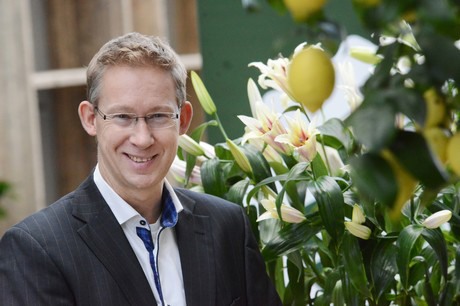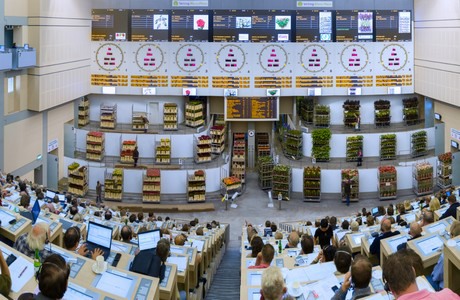
Ruud Knorr
The rise of online auctions - a threat?
Dealing with the ongoing digitization in the world is a challenge for Veiling-Rhein Maas. "Digital auctions have the ability to make physical auctions unnecessary. In the past, the flowers always passed the Dutch or German auctions, but due to the global transparency created by the internet, flowers do not have to pass us anymore. Roses for example can be shipped directly from a farm in Nairobi to Moscow, China or other countries, and will be invoiced directly too. This is what makes it a challenge for us. In order to stay in the game, we have to find a way to have the flowers traded through our auctions. This could mean directly from the farm. The product doesn´t necessarily need to be physically at the auction anymore."
Royal FloraHolland, parent company of Veiling Rhein Maas, already works with such a platform: FloraMondo. "We have to keep up with them. So, if we do not develop an online trade platform for Veiling Rhein-Maas, we will probably miss out on turnover. Besides, we currently cannot obligate a member of the cooperation to solely supply their volumes via our auctions as Veiling Rhein-Maas cannot facilitate this member."
But Veiling Rhein-Mass is currently developing pilots. "The challenging part is making the system compatible with that of Royal FloraHolland and Landgard. A supplier should not have to enter his prices on three or four different platforms. On the contrary, supplying though our auctions should save him time and money. Finding this synergy is important. All in all, it is an interesting but complex situation at the same time."
Is the era of the physical clock over?
Will these digitizations mean the end of the era of physical clocks? Knorr assumes the physical clock at Veiling Rhein-Maas will retain its importance. "At the moment we see that a maximum of 40 percent of our clients are eager to use remote buying and 60 percent are more eager to use the physical clock. In five years, this might change to 40 percent of our clients that buy on the physical clock and we will probably auction on fewer clocks, but I do not think they will disappear. I envisage that a part will remain and a part will definitely change. It will probably go to a platform like the stock market, that is also working with demand and supply. But in the end, the client will decide if a physical marketplace is still necessary."

Auction room Veiling Rhein-Maas.
Captivating clients
Besides investing in an online trade platform, another 'challenge' for Veiling Rhein-Maas is to keep captivating their clients and to strengthen their position in the industry. "Over the years, in Germany for example, the retailers who buy directly at the source increased in size and our clients, wholesalers and traders, decreased. Fortunately, this market - worth 8 billion, and we have a 10 percent market share - is still large enough to let us grow as an auction, but we also need to support our clients to stay in business in this industry. So, in order to achieve both, we have to continue to invest in satisfying our clients by keeping our products and our service attractive", says Knorr. In order to remain attractive to their target group, offering a broad and extensive range of products is the first step. "Together with Royal FloraHolland and Landgard, we benchmark our products. We always look from the perspective of our clients and we use a so-called bottom-up planning for cut flowers, houseplants and garden plants. Per day we need to define the optimum." Veiling Rhein-Maas also offers premium products, conducts clients survey, organizes meetings with growers and clients and offers wholesalers and traders ideas to increase their plants and flowers sales.
Import to overtake local?
Veiling Rhein-Maas auctions flowers and plants that originate from countries all over the world. "Everything is being sourced within the Netherlands and Germany and if we need more flowers or plants, the assortment will be expanded with imported products, that we source from 28 countries at this moment." Over the years, the supply of cut flowers, and roses in particular, from Africa and South American countries increased, while rose cultivation in the Netherlands and Germany decreased. Will import products overtake the European grown products in the future? Knorr does not think this will happen. "It is true that many roses are being imported from these countries, but on average, only 30-35 percent of cut flowers (which account for 45 percent of the annual turnover) are imported. This significantly differs per season. In the summer season for example, 80 percent of the flowers come from European countries and 20 percent is imported. In the winter this is the other way around", says Knorr. And he does not think this average of imported flowers will increase in the future. "The average amount of imported flowers might increase to 40 percent, but looking at the developments in Ethiopia, for example, I do not expect an increase soon. Besides that, the Netherlands has a lot of `year-round´ products."
Veiling-Rhein Maas
Veiling Rhein-Maas was established as a joint venture between Royal FloraHolland and Landgard. The decision to establish this auction arose from the demand for one clock from the suppliers in Germany and in the Netherlands, near the German border. In 2010 the Straelen-Herongen facilty was opened. "With a radius of 200 kilometers, the suppliers can reach 30 million potential clients", says Knorr.
Even though the auction had some challenges in its start-up phase, because the Dutch clients who were eager to hire space at the auction were required to set up a German legal form, this joint venture seemed to be a good initiative. "In the beginning, the Dutch clients were quite hesitant to hire space at the auction, but when the time passed, they all established a German legal form and we even had a waiting list. Now, the space is almost fully booked." Over five years, the turnover of Veiling Rhein-Maas increased by 90 million euros, from 260 to 350 million, and it is still increasing.
In a recent press release, Veiling Rhein-Maas announced their positive third quarter results. Compared to the same period last year, their quarterly turnover rose by more than 9 percent at the auction clocks, through Clock Pre-Sales and at the Clock Service department. And according to Knorr, it's not just this quarter that has been a good one; the last five years have been positive. "And in order to continue this positive trend, we need to invest in overcoming the current challenges."
Veiling-Rhein Maas
www.veilingrheinmaas.com










